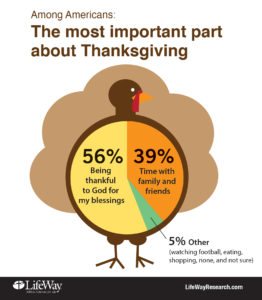By Matt Erickson
This is the season for thankfulness. While 39 percent of Americans told Lifeway Research “time with family and friends” tops their Thanksgiving priorities, more than half of all Americans (56 percent) says “being thankful to God for my blessings” is the most important part of the holiday.
And that’s a good thing because gratitude is good for us.

God commands gratitude. “Give thanks in everything, for this is God’s will for you in Christ Jesus” (1 Thessalonians 5:18). Calls for gratitude and thanksgiving are everywhere in the Scriptures. And for good reason.
Fallen humanity, in addition to being in rebellion against God, is fundamentally ungrateful. That’s Paul’s assessment in Romans 1:21: “For though they knew God, they did not glorify Him as God or show gratitude. Instead, their thinking became nonsense, and their senseless minds were darkened.”
Simply put, a lack of gratitude to God puts us out of touch with reality. We are dependent upon Him for everything, and He is entirely good. The only appropriate response is gratitude.
The good news is this is hardly a burdensome expectation or command. Gratitude is a large part of worship. It’s often linked with outward expressions of praise. In the Bible and in life, a grateful person is happier than an ungrateful one. The command to be grateful brings us blessing and joy, while bringing glory to God.
Some benefits of gratitude
Robert Emmons, a professor at the University of California, Davis, is one of the leading experts on gratitude. Emmons lists a number of research-backed benefits of gratitude, including greater optimism and happiness, a stronger immune system and better sleep, and a more helpful, generous, and compassionate lifestyle. Emmons believes gratitude is transformative for a number of reasons:
- Gratitude helps us stay in the present. When we’re focused on things we can give thanks for today, we’re not living in the past or worried about the future.
- Gratitude helps us avoid negative thinking, which when left unchecked, leads to negative emotions. You can’t be grateful and envious at the same time.
- Gratitude increases our resistance to stress. Grateful people tend to bounce back more quickly from adversity.
- Gratitude increases our sense of self-worth. Grateful people recognize the contributions others have made to their lives, and this transforms the way they see themselves.
Pastor and author Charles Stone writes regularly about faith and neuroscience. In a post on gratitude, Stone cites a study that showed participants who kept a daily gratitude journal had more energy and enthusiasm and were happier than the group who didn’t. This “grateful group” was also more likely to help others with a personal problem.
Gratitude activates brain regions associated with the feel good transmitter dopamine, as well as increasing the mood neurotransmitter serotonin, and the trust hormone oxytocin, says Stone. When we experience these positive brain effects through practicing gratitude, a “virtuous cycle” is created, resulting in us wanting to choose gratitude again.
While gratitude benefits us in a myriad of ways—we’ve only just scratched the surface—it’s definitely not a selfish pursuit. We mentioned how grateful people are more likely to help others. According to Stone, they’re also not as materialistic. “Several studies have shown people with higher levels of gratitude are more likely to have lower than average traits of materialism,” he writes.
Emmons indicates grateful people on average give 20 percent more time and money. Gratitude is a win-win situation, benefiting the grateful person and everyone around him or her.
Three ways to cultivate gratitude
1. Keep a gratitude journal. A few years ago Christian writer Ann Voskamp wrote the bestseller One Thousand Gifts in which she encourages readers to keep track of their blessings. Voskamp was writing from the perspective of spiritual transformation, and keeping a gratitude journal will certainly help us grow spiritually. But it helps in other ways, too.
Emmons told CNN: “People are 25 percent happier and more energetic if they keep gratitude journals, have 20 percent less envy and resentment, sleep 10 percent longer each night and wake up 15 percent more refreshed, exercise 33 percent more, and show a 10 percent drop in blood pressure compared to persons who are not keeping these journals.”
2. Count your blessings on a regular basis. Similar to keeping a gratitude journal, without writing everything down. This can be done in the morning, in the evening, and all throughout the day. It’s the application of the “give thanks in everything” verse.
It’s a way of recognizing and appreciating the many gifts we receive throughout the day—a kind word, a good meal, challenging work, a great song, an interesting book, close friends, a loving family, our faith, and on it goes. The more we notice, the easier it gets to notice more.
3. Use visual reminders. This might seem like the training wheels of gratitude, but it can be quite helpful. We tend to take things for granted. Worse, we tend to take God for granted. Emmons says forgetfulness and a lack of awareness are the two biggest obstacles to gratitude.
Simple reminders, like putting Scripture verses in places we’ll regularly see them, can prompt us to be grateful. Meaningful artwork is another way to trigger our memories. Some people like to drop notes of gratitude in a “gratitude jar.” And simply seeing friends and loved ones can remind us to be grateful. The point is to do whatever helps us recognize and appreciate our many blessings.
For more on American’s attitudes toward Thanksgiving, visit LifewayResearch.com.
MATT ERICKSON (@_Matt_Erickson) is managing editor of Facts & Trends.








